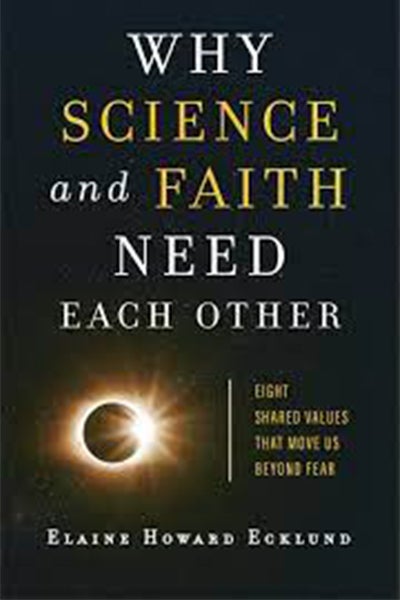Reviewed by Stanislav Panin, Graduate Student, Religion
Why Science and Faith Need Each Other, Eight Shared Values that Move Us Beyond Fear by Elaine Howard Ecklund, a professor of sociology at Rice University and the director of the Boniuk Institute, is addressed primarily to Christians who are suspicious of science and scientists and to scientists willing to learn about how Christians view science. Based on 15 years of social science studies, this Sunday School level text for a broad audience describes how Christianity and science can enrich each other and argues that the reason for tensions between the two is the mutual lack of understanding. “We cannot overestimate just how much misunderstanding there is between scientific and Christian communities,” Ecklund said when I interviewed her. We could nurture understanding between science and religion by finding common ground, she concludes.
Ecklund points out that despite perceived differences and mutual wariness, only 14 percent of Americans broadly and 25 percent of evangelical Christians “view science and religion as in conflict” (31). There is substantial space for dialogue, and one way to initiate it is through identifying shared values equally recognized by scientists and Christians.
In outlining these values, Ecklund focuses on the concept of humility. Humility is a traditional part of Christian ethics, understood as “being aware that we are not God” (79) and that “full truth can never be known because of our human limitations” (81). Ecklund elegantly shows how this Christian value is related to values traditionally associated with the sciences, such as curiosity and doubt, which are related to the same sense of human limitedness.
Like scientists, Christians also often feel a sense of awe and wonder with respect to the universe. Christians and scientists alike recognize the importance of reducing suffering and often see medicine as a way to achieve this. They also share concerns about the future of our planet. Christians call it “stewardship”—a belief that our duty is to make the world better and to maintain it in good shape. This religious conviction corresponds to a similar idea that exists in science in the form of environmentalism.
One recurring theme of the book is that issues between science and religion commonly perceived as almost irresolvable are often less significant than they appear. For instance, while some Christians are concerned that the concept of evolution undermines Christianity, others accept it without much trouble. Similarly, while some consider reproductive technologies morally objectionable, many accept them as “a sign of the God-given creative capacity humans have” (99-100). The number of Christians accepting in-vitro fertilization is higher than one might assume: According to Ecklund, 42 percent of evangelicals see it as acceptable and 32 percent think that it is not a moral issue at all (102).
Why Science and Faith Need Each Other is a beautiful book filled with insights about evangelical Christians and other Christian communities. However, in trying to establish the common ground between Christianity and science, it at times avoids or downplays particularly complex and divisive issues, such as abortion rights. Equally absent is the fact of religious pluralism and that the dialogue between science and religion also implies a negotiation of potentially conflicting beliefs and values of different religious traditions.
This aside, the book provides a valuable opportunity to look at the debates over science going on within evangelical communities. For Christian readers, it might help to establish a more meaningful relationship between their faith and contemporary science. For those outside the Christian tradition, it is a chance to learn more about how Christians see the world. Nurturing mutual understanding is never a bad strategy, and the book, without a doubt, contributes.

